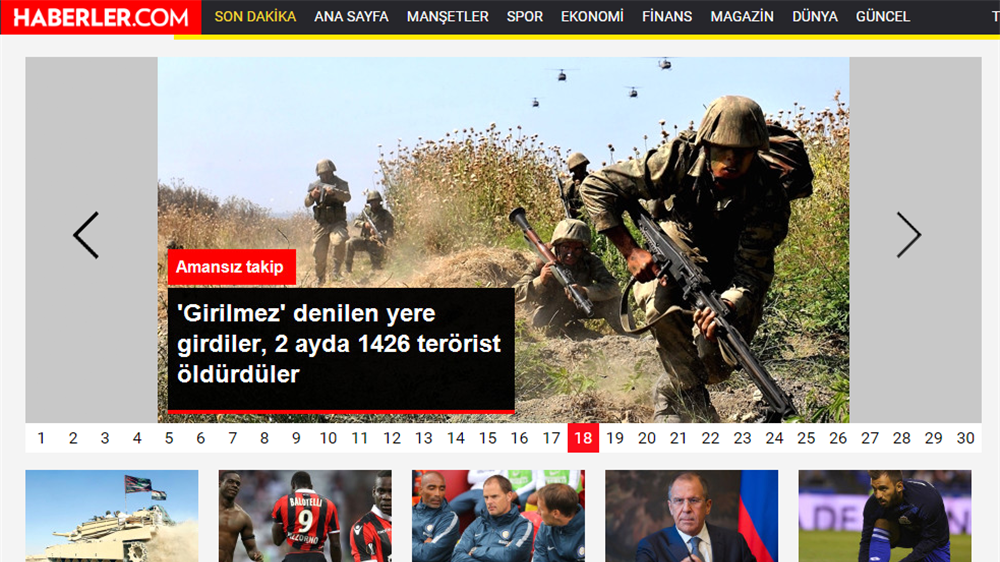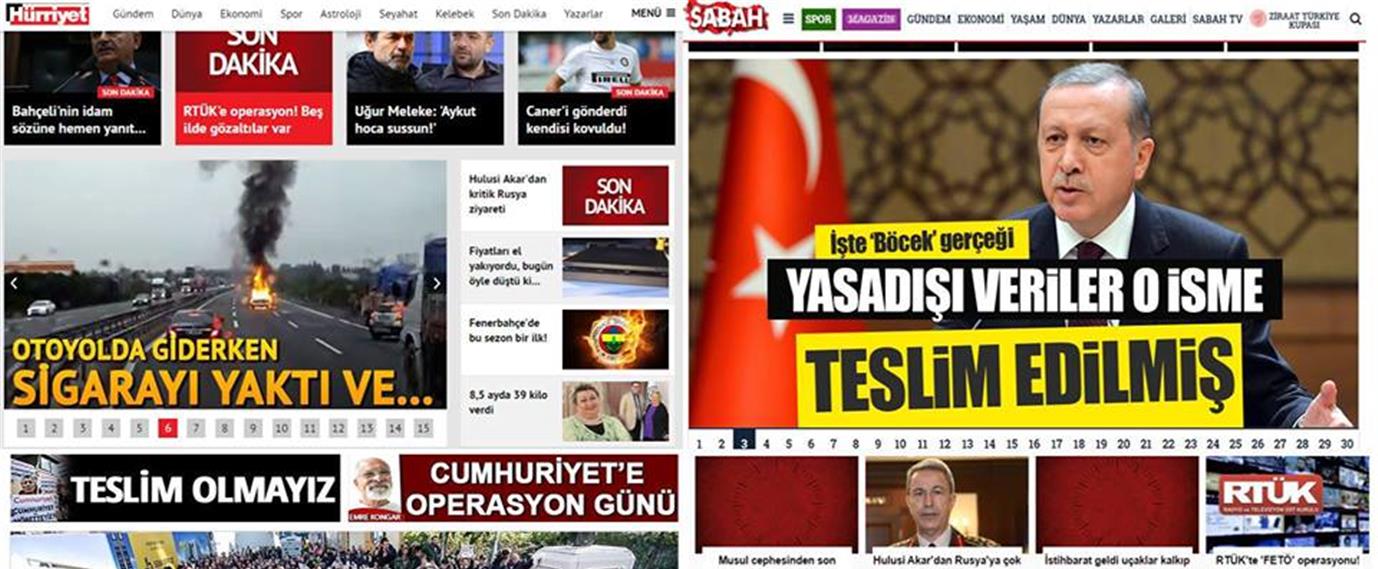تتبع الصحافة الإلكترونية في تركيا مدرسة خاصة بها في كتابة العناوين، تختلف بدرجة كبيرة جداً عن السائدة في المواقع الإلكترونية بالعالم العربي. وعلى الرغم من غرابة هذه المدرسة إلا أنها تلقى انتشاراً واسعاً وتتبعها الغالبية الساحقة من أكبر المواقع الإلكترونية الإخبارية الناطقة باللغة التركية.
هذه المدرسة التي لا يوجد لها تعريف واضح أو مُحددات رئيسية، تتبع "الغموض" كإستراتيجية أساسية لجلب المتابعين لقراءة أخبارها السياسية والاقتصادية وحتى الرياضية والفنية، وتلقى نجاحاً كبيراً، حيث تتميز الصحافة الإلكترونية التركية بقوة المتابعة وتُسجل مئات الملايين من القراءات شهرياً.
الغموض سيد الموقف
ينُص أحد تعريفات العناوين في الصحافة على أن "العنوان الإخباري: نص قصير، مختصر ومستقل عن جسم الموضوع من حيث التحرير أي يقرأ و يفهم لذاته دون الحاجة للموضوع ولكنه لا يشتمل على مادة مخالفة للموضوع أو عدم متوفرة في الموضوع. وهو يشتمل على أهم معلومة أو على واحدة من أهم المعلومات ويجيب مثل أي عنصر إخباري على سؤال من الأسئلة المرجعية.. من؟ ماذا؟ لماذا؟. وبأقل درجة متى وأين وكيف". (كورستين ماكدوغال، (2000
لكن على النقيض تماماً من هذا التعريف تسلك الصحافة الإلكترونية التركية مدرسة مختلفة ترتكز بالدرجة الأولى على "الغموض"، حيث تفتقد العناوين المستخدمة لمعظم العناصر الأساسية وفي أغلب الأحيان تكتفي بالإجابة على سؤال واحد أو أقل، وتُبقي الغموض يكتنف باقي العناصر من أجل اجتذاب أكبر عدد من القراء.
أبرز العناوين الثابتة والتي تستخدم بشكل يومي:
(مع الأخذ بعين الاعتبار خصوصية اللغة والفروقات الناجمة عن الترجمة الحرفية)
- "وصل خبر مؤلم"، هذه الكلمات الغامضة، هي عنوان شبه يومي لأخبار تتعلق في معظمها بمقتل وإصابة جنود أتراك في الهجمات اليومية للمتمردين الأكراد أو عمليات الجيش التركي في سوريا، ويمكن أن يأتي بأشكال قريبة مختلفة مثل: "خبر مؤلم من ديار بكر" "خبر سيء من غازي عنتاب"، "شهداء وجرحى من جنودنا"، دون أي ذكر لتفاصيل حول المكان أو الحصيلة أو طبيعة الخبر المؤلم.
- "ضربة مدمرة للتنظيم الإرهابي"، وعلى الرغم من أن تركيا تصنف وتحارب العديد من المنظمات "الإرهابية" إلا أن العنوان يكون واحد ويتكرر يومياً دون أي تحديد أو توضيح.
- وحول التصريحات اليومية والمكررة لكبار مسؤولي الدولة يتم استخدام عناوين من قبيل "تصريحات هامة لأردوغان"، "كلمات قاسية من يلدريم"، "تهديد قوي من كليتشدار أوغلو"، وعن تنقلات الرئيس تكتب هذه المواقع "أردوغان يذهب إلى هناك.." "زيارة مفاجئة لأردوغان إلى..."، وفي هذه الحالة أنت مجبر للدخول إلى الموقع إن كنت تريد معرفة إلى أين ذهب الرئيس!.
- "عملية أمنية ضخمة" يمكن أن يتعلق الأمر بعملية ضخمة بالفعل ضد تنظيم الدولة، أو مسلحي تنظيم العمال الكردستاني، ويمكن أن يكون نفس العنوان لعملية أمنية صغيرة ضد بعض المشتبهين أو تجار المخدرات أو السارقين، تختلف الأخبار ويبقى العنوان ثابتاً.
- "قتلوا جميعاً" في أخبار محلية عن مقتل مسلحين من العمال الكردستاني أو أخبار من سوريا والعراق عن حادث قتل أو قصف يتم وضع هكذا عنوان مع صورة لا تعطي دلالات واضحة عن الخبر وتزيد من غموضه وتشويق القارئ لمعرفة "من الذين قتلوا؟".
- "حادث طرق مثل المذبحة" عنوان لا يغيب عن الأخبار الصباحية لمعظم الموقع ويتعلق بحوادث الطرق اليومية التي تشهدها طرقات البلاد وتؤدي إلى وقوع قتلى وجرحى، لكنك لن تجد أي عنوان يقول على سبيل المثال "5 قتلى و10 جرحى في حادث طرق بإسطنبول"، عدد الضحايا ومكان الحادث سر لا يمكن معرفته إلا بالدخول وقراءة تفاصيل الخبر.
- "وفاة شخصية مشهورة" أو "فقد حياته" سواء كانت شخصية فنية أو سياسية أو رياضية أو حتى شخصية غير مشهورة بالفعل تجد هذا العنوان الموحد لأخبار الوفيات ويمكن أن تجده مُبرزا في الواجهة الرئيسية للمواقع الكبرى.
")تحذير هام إلى جميع سكان اسطنبول"، يستخدم هذا العنوان في أبسط الأخبار المتعلقة بإغلاق أحد الطرق أو وجود تحذير من دائرة الأرصاد الجوية باحتمال سقوط أمطار أو رياح قوية، لكنه يتصدر الأخبار الأكثر قراءة كون العنوان أوحى للقراء أنه موجه لهم بشكل مباشر، ويبرز أيضاً عنوان "الثلوج قادمة".. كلمتان فقط لا تتضمنان أي إشارة للمدينة المذكورة.
- "خبر سار لسكان أنقرة"، عندما يتعلق الخبر بوجود تخفيض ضريبي، شق طرق، تأسيس خطوط مترو أو أي خدمات تُقرها الحكومة لسكان تركيا أو أي مدينة يتم الاكتفاء باستخدام هذا العنوان.
هل ما زال ذلك ممكناً؟
المتابع الخارجي لهذا النوع من الصحافة والعناوين، يتساءل بشكل دائم "هل ما زال تطبيق هذا الأسلوب ممكناً؟"، "هل يمكن خداع الناس بشكل مكرر يومياً وبنفس الطريقة؟"، "ألم يمل الناس من هذا الأسلوب؟"، وجميعها تساؤلات منطقية جداً لكن الواقع يؤكد أن ذلك ما زال ممكناً بالفعل.
فالصحفيون لم يملوا من هذه العناوين والقراء ليس لديهم خيار آخر، فهذه العناوين تحمل كماً هائلاً من التشويق وتُولد لدى القارئ رغبة جامحة في معرفة التفاصيل، وإذا لفتنا إلى أن الصحافة التركية ترتكز بالدرجة الأولى على الاهتمامات الداخلية واليومية للمواطن يمكن أن نفهم سبب تفوقها على الصحافة الإلكترونية العربية من حيث زخم المتابعة وأرقام المتابعين.
علاقة العنوان بالصورة
لطالما أكدت كتب الإعلام والتحرير الصحافي على أهمية الصورة في الخبر وعلاقتها بالعنوان وضرورة اختيار أفضل الصور لتحقيق أكبر قدر من الفهم والتشويق للخبر، كل ذلك كان مطبقاً في الصحافة الإلكترونية العربية، لكن الأمر مختلف تماماً في الصحافة الإلكترونية التركية.
فالصورة هي العنوان بالدرجة الأولى، وما يكتب من كلمات قليلة ربما لا تتجاوز الكلمة أو الكلمتين هي محاولة فقط لزيادة التشويق للموضوع وليس لإعطاء معلومات أكثر حوله، ويتم الاعتماد على الصورة لمنح القارئ تصورا أكبر عن طبيعة الخبر لا عن تفاصيله أو عناصره الأساسية.
وكما هو موضح في الصور، تُصميم أغلب المواقع الإخبارية التركية بشكل موحد تقريباً بحيث يكون في أعلى الموقع لوحة الأخبار الرئيسية التي تتضمن أخبارا مرقمة من 1 إلى 10 أو 20 أو حتى 30 في بعض الأحيان، وكل خبر هو عبارة عن صورة كبيرة وعنوان صغير.

لكن المختلف هنا هو عدم وجود مكان ثابت للعنوان، أو عدم وجود مكان أصلاً لكتابة العنوان، فهو يكتب باستخدام برامج التصميم "الغرافيك"، حيث يتم كتابة العنوان فوق الصورة مع استخدام خطوط وألوان وأحجام مختلفة وربطه بأسهم وصور مركبة وتصميمات لتحقيق أكبر قدر من الجذب والتشويق للموضوع.
ولا نتحدث هنا عن تصميمات معقدة أو عملية تحتاج إلى جهد كبير، فالأمر مطبق على جميع الأخبار العاجلة والمعمقة والتصريحات، فهذه المواقع لديها كم كبير من القوالب ويتم التحكم بها بسرعة كبيرة من خلال تركب عنوان جذاب وغامض ومختصر جداً على صورة قوية فتكون المحصلة خبر يحمل كم كبير جداً من التشويق.
هل يمكن تطبيق "المدرسة التركية" بالصحافة الإلكترونية العربية؟
العنوان التقليدي السائد في الصحافة الإلكترونية العربية يقدم كم كبير من المعلومات ويجيب على معظم التساؤلات التي قد تهم القارئ بشكل مباشر، وبالتالي باتت نسبة كبيرة من القراء لا تشعر بأي فضول أو حاجة للدخول إلى تفاصيل الخبر، فطالما أن العنوان (50 قتيلاً في قصف روسي على حلب) و(مقتل 20 من الجيش العراقي في تفجير قرب الموصل) و(مقتل 10 حوثيين في اشتباكات بتعز) و(استشهاد فلسطيني برصاص الاحتلال في الضفة العربية) فلا يوجد أي حاجة لمعرفة تفاصيل إضافية لأخبار يومية مفهومة السياق والتفاصيل ولا تحمل أي مفاجئات جديدة.
ومع اشتداد المنافسة، وبما أن المواقع تعتمد في تصنيفها وقوتها وأرباحها –إن وجدت أو كانت تعتمد عليها- على عدد القراء، فاضطرت نسبة كبيرة من المواقع إلى محاولة التجديد باستخدام العناوين والابتعاد قدر الإمكان عن العناوين التقليدية التي بات لا تجلب إلا نسبة قليلة جداً من القراء الذين يرتئون الدخول لقراءة تفاصيل الخبر.
لكن التجديد الحاصل في عناوين الصحافة الإلكترونية العربية يبدو حذراً بدرجة كبيرة، فالعناوين التركية أقرب إلى حد كبير إلى الصورة الراسخة عند الصحفي والقارئ العربي عن "الصحافة الصفراء" أو "صحافة الإثارة" بمعنى أن انطباعها سلبي جداً، وبينما تجرأت بعض المواقع الصغيرة الجديدة على استخدام قريب للعناوين التركية، تخشى المواقع الإخبارية الوازنة من السقوط والتراجع في حال أقدمت على استخدام هكذا عناوين. ومع صعوبة تطبيقها على الأخبار السياسية والميدانية اليومية، عززت الصحافة الإلكترونية العربية من استخدامها لأساليب جديدة في التقارير التي تحتوي على شرح وتحليل ومقابلات وشخصيات، ويتم استخدام عناوين الاستفهام والتناقض والتقابل وغيرها.
ولا يبدو أنه من الممكن تطبيق العناوين التركية في المواقع الإخبارية العربية بشكل منفصل أو جزئي، فالحكم على مدى إمكانية نجاح هكذا نموذج، يحتاج محاولة جادة لإنشاء موقع إخباري يطبق بشكل كامل النموذج التركي من حيث التصميم الفني للموقع واستخدام الصور وانتقاء الموضوعات وسلاسة اللغة وإيجاد صيغ أخرى مشابهة للمحتوى التركي لكنها تتناسب مع اللغة العربية.
إلا أن السؤال الأبرز يبقى هو "إلى أي مدى يمكن أن يتقبل الجمهور العربي هذا النموذج؟".








































